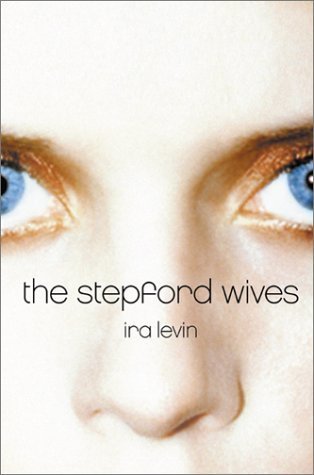Today, I'm looking at a classic sci-fi novel The Stepford Wives which has gotten two movie adaptations and has even entered the lexicon as a phrase in and of itself. The book really is more of a novella, clocking in at about 130 pages, but I think that the brevity really works to its strength rather than a weakness.
Because the book has become in many ways part of the cultural zeitgeist you're probably familiar with the generalities of the plotline. A new family moves to the neighborhood of Stepford and the mother, Joanna, notices that something is...off...about their neighbors. The women all seem friendly enough, but they spend all their time on housework and say they're far too busy to spend any time on social activities. Joanna manages to meet a handful of other women who are also recent transplants to Stepford and agree that something is weird about Stepford. And then one by one the members of the group start turning into Stepford wives themselves, their entire old personalities erased.
The book itself is a little vague about what happens to the women after they've been ''Stepford-ized''. It's implied they're replaced by robots, but I personally like the idea of them being brainwashed and reprogrammed better. Either way it's very creepy and the pacing works incredibly well to underscore that.
The book is, of course, about feminism and was published in 1972, putting it solidly within the era of Second Wave Feminism which, among other issues, included a drive by white women to escape the role of housewife that had been created by the post-war American economy. Women fought for opportunities outside the home and equality in the workplace. And yes, I'm grossly oversimplifying a critical movement in United States history, but that's how it's relevant to this work. As this book relates to feminism it's not even subtext, Joanna is a member of the National Organization of Women and is ready to march on the Stepford Men's Association because of their exclusion of women.
The sad thing is that this book, much like Handmaid's Tale, remains incredibly relevant. We are in the middle of a great political struggle in the United States and there are people who seriously suggest that women's natural place is as a wife and mother and women shouldn't work outside the home. Some people go so far as to argue that this is what's undermining ''western civilization'', completely ignoring the fact that women have had to work for most of history to support their families, and even if a woman chooses to take care of her home and children, that is valuable unpaid work that she provides. And yes, women do far more unpaid work than men. Unfortunately we're at a point where we still need feminist propaganda.
Looking at this as a book, as I said the brevity of the book I think actually works to its benefits. As Joanna gradually pieces together what's going on in Stepford, she realizes that time is running out for her and her husband may already have plans to replace her with a submissive, zombified version of herself. As you start physically running out of book, you know that Joanna is running out of time as well and you hope that she can get away and get help before she becomes Stepford's latest victim. It made for a very emotional reading experience.
Overall I'd definitely recommend reading this book. It's a short and easy read and while it's not subtle, it packs a huge emotional punch and remains frustratingly relevant.
- Kalpar


No comments:
Post a Comment